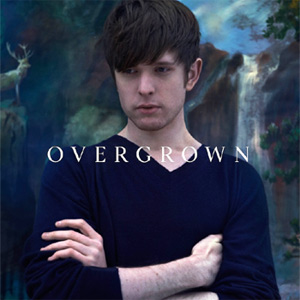In a recent interview with The Guardian, James Blake – when speaking of the mainstream music industry he seems to have made some Faustian pact with – said "I’m starting not to care, to be honest. Things are changing. The ship isn’t just going down. There are people trapped inside, bashing on the windows trying to get out." Although he was presumably talking about the people working behind the scenes in A&R, marketing, accounts and whatever other segments of the sinking industry are waiting to be thrown overboard in a futile attempt to keep the creaking vessel afloat, on listening to Overgrown, it seems almost as likely that he was talking about himself.
The spectre of Blake’s more mainstream aspirations seem to loom over Overgrown at every turn. Although not a terrible album by any means, for those who still remember Blake as one of the more innovative producers to emerge at the turn of the decade, it’s something of a struggle. This isn’t helped by the bizarre way in which the album was originally unveiled; the initial cover art was beyond parody, featuring a grumpy looking Blake in the midst of a bizarre wilderness scene, complete with stag photobombing its way into shot in a manner that inspired the kind of Microsoft Paint-based ridicule on Twitter you’d expect for something so poorly judged. When the album was released two months later, the cover art had been changed, but its original concept – combined with a ridiculously overblown video for lead single ‘Retrograde’ that played out like the setup for an aborted M. Night Shyamalan film – led some to wonder just how much control Blake had over the whole process.
Compared to his self-titled debut, Overgrown is bigger in scale in exactly the way you’d expect, and when it works, it’s positively cinematic. The album’s opener makes a bold statement; contrasting its subtle, folky moments with bombastic Barry-esque sweeps, Blake makes you instantly forget the introspective artist whose debut in 2011 hid his vocals behind warbling effects and lo-fi synth textures, and in the context of this cinematic yet discrete orchestration, Blake’s vocals are given the backdrop they need to shine. The interplay between Blake’s hesitant piano and introspective gospel on ‘DLM’ and ‘Our Love Comes Back’ show his vocals in a similarly good light; although bordering on frustrating, the vocal and instrumentation pull against each other with just enough tension to prevent the whole thing slipping into a neo-soul muzak vortex.
Interestingly, it’s when Blake feels the need to reference the dubstep and electronic music structures of his past that things feel at their weakest. The moody house pulse of ‘Voyeur’ has all the dubstep informed spaciousness of Blake’s early productions, with a rippling cowbell and cascading arpeggio perfectly balancing the melancholy in its heavenly synth backdrop; why therefore he chooses to close the track with a messily ill-judged attempt at a wonky acid house climax is baffling. The overly showy ‘I Am Sold’, where his voice is sunk beneath copious filter and thunderous snares, and the cluttered R&B referencing mulch of ‘Life Round Here’ feel like a step back in comparison, the latter of which threatens to become as busy as the worst YouTube example of Blake parody.
Given Blake’s increasing stock, celebrity appearances were inevitable, though the inclusion of RZA in ‘Take A Fall For Me’ isn’t nearly as bad as some have claimed. If anything it demonstrates how much stronger Blake is when he takes a back seat as a producer; like his fantastic Harmonimix versions of grime MC Trim, Blake manipulates RZA’s lead vocal to create the eerie sense of RZA being chorused by himself, delivering as interesting a pop song as you’d imagine, even if the lyrics, which see the US rapper reference fish and chips, stout and poltergeists are as awkward as you might imagine. The Brian Eno collaboration ‘Digital Lion’ is a different story; its aimless, fractured vocals and Eno-lite ambient pads combines the worst traits of both artists into one limp package.
It seems almost cruel to criticise Blake for the audacious steps he takes in Overgrown to expand his music, but the problem is that it just doesn’t feel like it suits him. It wasn’t surprising when Blake collaborated with Bon Iver’s Justin Vernon in 2011; their vocal delivery edges towards the tortured, their falsettos straining to wring every drip of emotion out of their vocal cords. But while Vernon forces you to share in every fraught detail of his misery, it’s difficult to hear where Blake’s pain is coming from, or indeed to engage with it on any level beyond the superficial. "We’re going to the last/You and I” sings Blake on penultimate track ‘To The Last’. Despite its sincerity overload, its delivery sounds as hollow as the swelling synth chords used to drive its message home.
Lead single ‘Retrograde’ is perhaps the encapsulation of everything that doesn’t quite feel right about Overgrown; on the surface it’s the most accomplished thing Blake has written, but for all heartstrings the production tries to pull, he delivers the vocals with all the conviction of a scripted reality show participant trying to convince those at home the whole performance isn’t a massive sham. Blake may have dispensed with some of the more experimental and emotionally obtuse trappings of his debut album on Overgrown in an attempt to engage more directly with a wider audience, but his intentions are all but drowned out by a thick glass porthole being hammered on feverishly by a dozen drowning onlookers.


